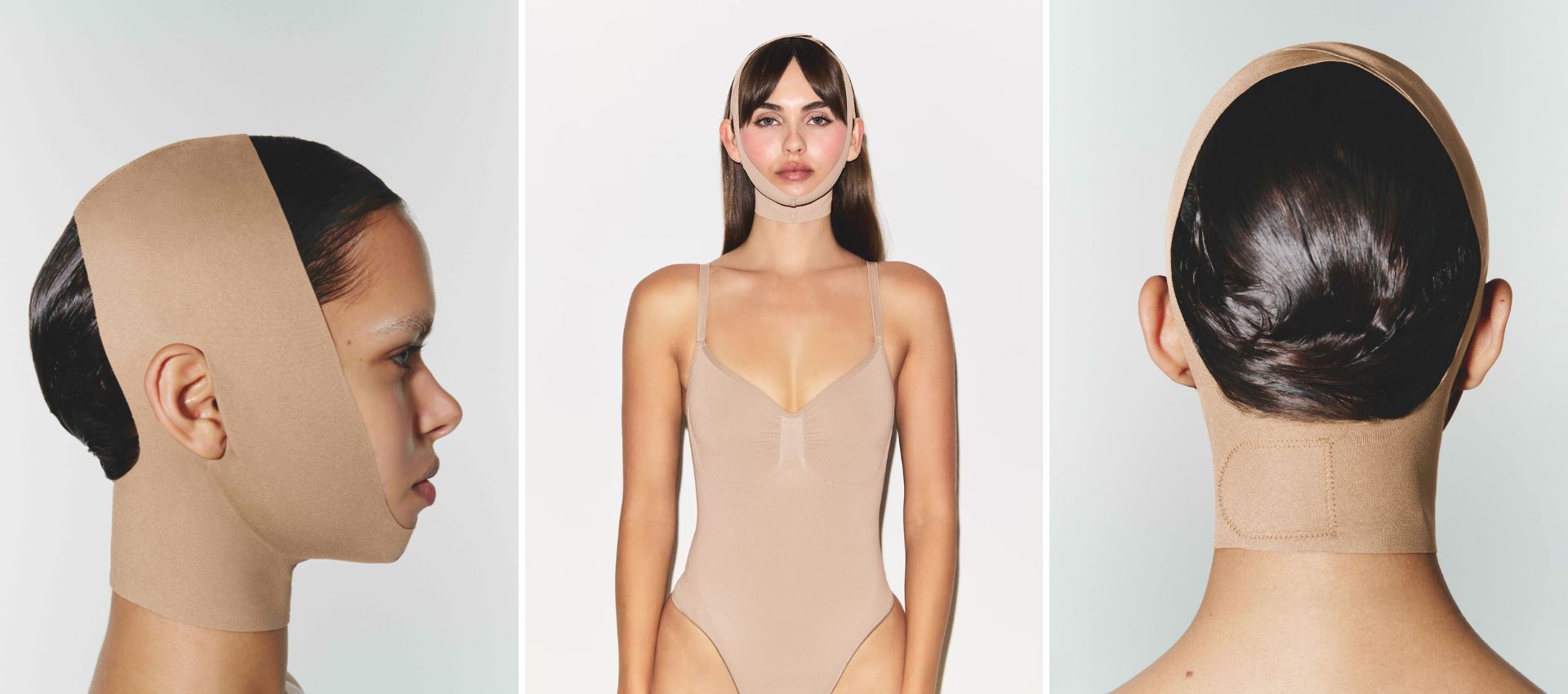Kim Kardashian’s Skims Face Shapewear and *that* Sydney Sweeney Ad Reveal a Rise of Regressive Ideals Online
Inside the nostalgia for toxic beauty and politics


It’s been a bad week to be on the internet. Kim Kardashian’s Skims has launched a new line of shapewear… for your face. Sydney Sweeney fronted a controversial campaign for American Eagle, igniting debate about race and Western beauty standards. Then there’s Bonnie Blue’s latest documentary and the dark underbelly of sex as spectacle. Oh, and to add to the Black Mirror-ness of it all, Gwyneth Paltrow cosplayed as the new CEO of Astronomer, Donald Trump Jr shared an AI-generated image of Donald Trump in double denim parodying the aforementioned ad, and the White House released a deportation video captioned, “When ICE books you a one-way Jet2 holiday to deportation… Nothing beats it!” overlaid with the infamous Jess Glynne track.
So, what does all this tell us—aside from the fact we’re all going to hell in a handbasket? Though face shapewear, a woefully tone-deaf advert (if we’re being generous), and OnlyFans might seem unrelated, in many ways, they all point to the alarming direction social media is headed (hint: backwards).
Everywhere I look, signs point to the digital world—which once promised progress, self-expression, and democratised voices—paradoxically becoming an engine for reviving regressive beauty standards and reactionary politics. Far from liberating us from outdated norms, platforms like Instagram, TikTok, and YouTube are now complicit in amplifying hyper-conservative aesthetics and ideologies that roll back decades of social progress.
This is all the more worrying when you consider that Gen Z is set to spend 25 years of their life on their phones. A new study, focused on phone use in education, revealed that usage was dominated by social media, messaging, and streaming. This aligns with research commissioned by Heineken, showing the average adult spends 5 hours and 48 minutes a day on their phones—that’s 88 days a year. By now, we’re well aware of the mental toll of doomscrolling and comparing our lives to the curated perfection of those we follow, but what’s emerging is far more insidious. Social media is fuelling a rise in real-world regressive politics and outdated beauty ideals.
@americaneagle Posters up. Secrets out: Sydney Sweeney has great jeans. Get them at the 🔗
♬ Best One Yet - Layup
There’s always the risk of looking back through rose-tinted glasses, but at one time, social media felt like a haven for body positivity and the rejection of narrow beauty ideals. Increasingly, however, the most viral beauty trends promote an uncanny return to ’90s thinness, Eurocentric features, and surgically enhanced femininity—often under the guise of “natural” beauty.
We’ve seen this in the rise of the “clean girl,” the “trad wife,” and the “hyper-feminine baddie” aesthetics, which glamourise highly curated looks that depend on wealth, whiteness, and conformity. Platforms reward visual content that fits an algorithmic mould of desirability. We should be worried about who is determining this matrix.
Glassy skin, tiny waists, big eyes, and symmetrical features dominate our feeds not because they are more common, but because they are more clickable. Beauty today is narrow, hierarchical, and increasingly retrograde. Sydney Sweeney is currently in the eye of this storm, not least because she conforms to these beauty standards. Of course, the fact that she’s been embraced by America’s right-wing is through no fault of her own. She’s simply the latest in a long line of All-American sweethearts. I assume this is in large part what attracted American Eagle to her, but it’s also what made the advert so disastrous.
Celebrity news, beauty, fashion advice, and fascinating features, delivered straight to your inbox!
For anyone lucky enough to have missed the media maelstrom: in American Eagle’s latest campaign, the camera zooms into Sweeney’s cleavage, bursting out of her denim two-piece, overlaid with a breathy audio: “My body’s composition is determined by my jeans (or is it genes)?” In another ad—no longer on social media—she reclines on a vintage Mustang, reciting inherited traits: “Genes are passed down from parents to offspring, often determining traits like hair colour, personality, and even eye colour.” She continues: “My jeans are blue.” Defenders say it’s a hackneyed play on words; denouncers call it a dog whistle for white supremacists. The online discourse is deafening, so I won’t add fuel to that particular fire. Yet what seems undeniably true is that the return to so-called “traditional” beauty standards is now the dominant aesthetic.
Further proof? Another launch that sent the internet into a tailspin: Kim Kardashian’s Skims face shapewear, which the official press release describes as “a must-have addition to your nightly routine.” The backlash was swift: “SKIMS: Making women feel bad about themselves since 2018,” read one comment. “What in The Handmaid’s Tale am I looking at?” asked Michelle Elman. Alex Light, a body confidence coach, likened the “Ultimate Facewear” to post-surgical compression garments as well as the Scold’s bridle—a medieval torture device used to punish and humiliate (primarily) women deemed as “scolds” (women who spoke too much). The Kardashians do not act flippantly; they will go down in history as some of the most prolific and profitable marketers of all time (schools literally teach their methods). So I cannot imagine a world in which this product launch is anything but calculated.
It seems even in sleep, women are expected to self-optimise—the shapewear claims to sculpt your jaw while you sleep, though Harley Street Skin Clinic’s medical doctor Dr Nikita Desai says that at best, face wraps of this kind offer “temporary changes...and may help with de-puffing your face”. Desai also theorises that the design has taken inspiration from TikTok’s ‘morning shed’ trend, which promotes the idea “the uglier you sleep, the prettier you wake up.”
Skims’ shapewear doesn’t exist in isolation, it is part of a wider cultural shift that normalises weight-loss injections and promotes an AI-driven vision of homogeneous womanhood, argues Light.
A post shared by Alex Light - Body Confidence 🕊 (@alexlight_ldn)
A photo posted by on
Just as beauty ideals regress, so too do politics. This has played out in the “trad wife” phenomenon, where influencers like Hannah Neeleman, better known as Ballerina Farm, and Estee Williams, with huge social followings, espouse submissive roles, homemaking, and—in some cases—anti-feminist values. These creators often cloak their ideas in soft aesthetics and visions of domestic bliss, making the return to patriarchal norms feel less like oppression and more like personal choice. At the other end of this spectrum, Bonnie Blue also subscribes to this form of “choice feminism.”
The “choice feminism” narrative—the idea that any decision made by a woman is inherently feminist—blurs the line between agency and internalised oppression. Wearing face trainers, enjoying promiscuous sex, or embracing traditional gender roles isn’t inherently anti-feminist, but when these choices are made in environments where conformity is the price of visibility, they’re less about liberation and more about metrics.

This blend of nostalgia and performance is potent. Social media romanticises eras marked by rigid gender roles and systemic inequality, reframing them as times of simplicity and “natural order.” Users, especially younger ones, are often drawn to these aesthetics not for their historical accuracy but for the illusion of stability and meaning they provide in an age of uncertainty. That, to me, is worrying.
Of course, this isn’t the whole story. Many creators are using the same platforms to challenge these trends—amplifying inclusive beauty, dismantling gender norms, and pushing back against the romanticisation of oppressive pasts. Recognising the politics behind the aesthetics is the first step. Without it, we risk social media not only continuing to shape how we look but also what we believe. We’re all at the mercy of the algorithm, and in its current iteration, platforms that once promised a better vision of the future are turning into portals to the past.

Mischa Anouk Smith is the News and Features Editor of Marie Claire UK.
From personal essays to purpose-driven stories, reported studies, and interviews with celebrities like Rosie Huntington-Whiteley and designers including Dries Van Noten, Mischa has been featured in publications such as Refinery29, Stylist and Dazed. Her work explores what it means to be a woman today and sits at the intersection of culture and style. In the spirit of eclecticism, she has also written about NFTs, mental health and the rise of AI bands.